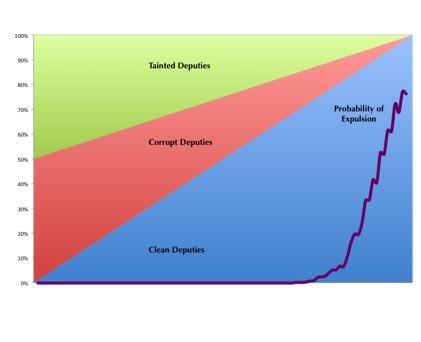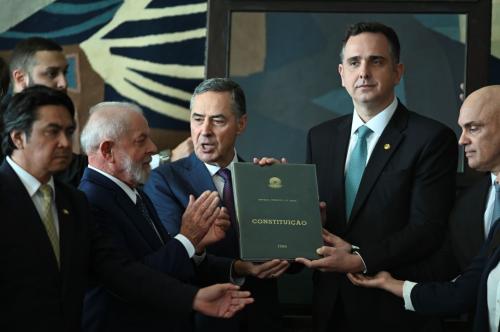When it comes to governing a nation, ethical leaders are vital not only because the integrity of their decisions influences important policies, but also because the ethics of political leaders influence the likelihood that they will hold their colleagues accountable for misconduct.
As a rising global superpower, Brazil is currently grappling with problems of corruption. One of the most pressing questions for Brazil is whether a more efficient government with enhanced ethical standards will steer the country in the right political direction or whether the status quo of dirty politics will sideline Brazil from achieving its full potential.
The creation of an ethics committee in the lower house of Brazil’s Congress in 2002 was certainly a step in the right direction. However, holding public servants accountable in a competent and reliable manner has proven to be a thorny issue for this newly-formed body. The committee faces the daunting task of reining in corruption in the chamber of deputies, an institution known for episodes of deep-seated venality and for the long-standing impunity of some of its most corrupt members.
Yet, there are factors that can increase the committee’s chances of success in its endeavor, notably public attention, voting rules and the integrity of current members of the Brazilian Congress. In this regard, we discuss how the recent Clean Slate Law (Lei da Ficha Limpa), approved in June 2010, can influence accountability within the Congress by changing the relative proportions of clean and corrupt Congressional representatives. Such changes can have an influential effect on the likelihood that corrupt deputies will be held accountable.
To test this assertion, we built a computer simulation based on the composition of the Chamber and the actual behaviors of Brazilian deputies when they were asked to vote on whether or not to expel their peers for corrupt behavior. Figure 1 shows the result of this simulation in terms of the probability that deputies will vote to expel a corrupt peer, as we shift the proportion of clean, corrupt, and tainted deputies (this last category is intermediate, lying somewhere between completely clean and completely corrupt). The figure begins on the left side with a Chamber evenly split between dirty and tainted deputies. The number of clean members gradually rises from 0 percent on the far left to 100 percent on the far right (we assume that the concomitant reduction in the number of corrupt and tainted deputies is evenly split between dirty and tainted types). Superimposed on the graph is a heavy line indicating the simulated likelihood that the Chamber will vote to expel a legislator involved in a corrupt scandal, holding constant other factors such as the certainty of the accusations against him/her and his/her relative power in the Chamber.
Figure 1: Composition of the Chamber and Probability of Expulsion

Source: Butto, Pereira, and Taylor (2010)
The graph points out that it takes a relatively large shift in the percentage of clean deputies for the likelihood of expulsion to become significant. Even when the Chamber is 50 percent clean, the likelihood of expulsion is nil. However, there is a tipping point in terms of the proportion of clean deputies, beyond which the likelihood of punishment grows rapidly. Holding other factors constant, as the Chamber’s composition rises from 74 percent clean to 93 percent clean, the likelihood of a vote for expulsion on the floor of the Chamber rises rapidly, from 1 percent to over 53 percent (reaching 77 percent when the Chamber is composed solely of clean deputies). In other words, very slight changes in the composition of Congress can have self-reinforcing effects in terms of the likelihood of accountability.
The model exemplifies the vital importance of removing corrupt politicians. Brazil appears to be on the cusp of potentially significant improvements in accountability. Perhaps most important among the recent changes is the Clean Slate Law, which prohibits candidates who have been convicted of a crime (in an appeals court) from running for office. Although it has its shortcomings, the law will make it harder for undeniably criminal politicians to hold office. As a result, there will be serious implications for accountability in Congress, and more broadly, in the Brazilian political system.
By reducing the proportion of obviously-venal deputies, the Clean State Law can strengthen the accountability process in the Chamber, shifting it closer to the right-hand side of Figure 1. However, and this is important to emphasize, the opposite is also true: small reductions in the proportion of clean deputies could lead to a drastic drop-off in accountability. According to our simulation, which is based on the behavior of the Chamber in expulsion votes during the 2003-2006 term, if roughly 1 of 20 corrupt deputies was replaced by a clean peer, Brazil may well move toward a more stable pro-accountability equilibrium. However, a shift in the proportion of corrupt politicians by as little as 1 in 10 deputies could move Brazil to a zero-accountability equilibrium.
With the implementation of the Ficha Limpa, therefore, the political system has gained a tool of accountability that pushes it closer to the positive- pro-accountability side. But it is worth emphasizing that the law was passed against the wishes of most politicians; and was only approved because it was proposed via popular initiative, through a petition signed by nearly 2 million citizens. Congress was not eager to pass the law, but the surge of public support was irresistible. And once it was approved, the Brazilian Supreme Federal Tribunal also faced intense public pressure to implement the law in the 2010 elections.
The outcome? A number of heavyweight politicians whose records came under scrutiny have been barred from serving, including former Governor Joaquim Roriz and the former President of the Chamber Jader Barbalho. Many others are waiting for a final verdict from the Brazilian courts. The law has been transformational for the election process, as illustrated by a poll conducted by FGV Direito-Rio a week after the October 2010 presidential elections, which found out that 73 percent of the 1,300 sample took the law into consideration when choosing a candidate.
Despite these gains, however, problems remain. Professor Vitor Marchetti, a scholar of the electoral court system, has pointed out that one unintended consequence of the law is that it may further judicialize electoral campaigns. This is particularly worrisome because the courts have been ill-prepared for the challenges resulting from the new law. So far this year, more than 200 cases have been appealed to the Supreme Electoral Court (TSE) after lower courts determined that the candidates were ineligible to serve. As of December 13, the TSE has decided 164 appeals, and more than a third of those appeals were upheld, clearing the politician to take the oath of office. There is great uncertainty, with more than half of the remaining appeals still awaiting a final court decision even though incoming deputies were expected to take the oath of office on December 2010. There appears to be no guidance on what rules to follow in those cases that are not addressed in time.
Despite these shortcomings, however, the adoption of the Clean Slate Law displayed how civil society pressures can drive accountability reforms forward, even when the underlying institutions are deeply corroded by corruption. Brazil is strengthening its governance institutions, however slowly, and in doing so it is further institutionalizing key democratic norms and practices. The challenge for Brazil is to continue the effort and deepen it, since the gains made thus far are fragile and the underlying problems of accountability are great.
References:
Butto, Michelle; Pereira, Carlos; and Taylor, Matthew (2010) “Accountability Behind Closed Doors: Legislator Power and Voting Procedures.” Paper presented at the 2010 Meetings of the International Society for New Institutional Economics, University of Stirling, Scotland, June 17-19.
Marchetti, Vitor. “O TSE e a Lei da Ficha limpa: algumas considerações.” Valor Econômico, August 8, 2010.
Oliveira, Fabiana Luci and Joaquim Falcão, “Poder Judiciário e Eleições 2010”, survey conducted by FGV Direito Rio, November 2010.



Commentary
Op-edClean Slate Law: Raising Accountability in Brazil
December 22, 2010